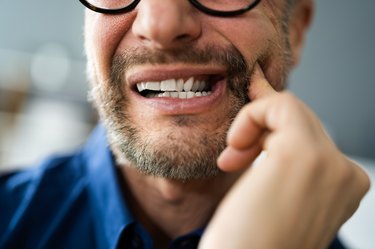
Waking up feeling like someone socked you in the jaw? Morning jaw pain is no joke.
While you might experience an occasional sore jaw from sleeping in a weird position (more on this later), chronic jaw pain in the a.m. might be a sign of something more serious.
Video of the Day
Video of the Day
Here, dentist Craig Ratner, DMD, former president of the New York State Dental Association, explains why you might wake up with jaw pain and what you can do to manage or decrease the discomfort.
1. You’re Grinding Your Teeth
Nighttime teeth grinding or clenching is one of the most common reasons your jaw hurts when you wake up.
"Bruxism, commonly known as teeth grinding or clenching, can happen during the night or day, but for most people, it is more commonly a nocturnal problem," Dr. Ratner says.
The issue is, this habit is totally unconscious, i.e., you likely have no clue you're clenching (until you experience pain).
"There are some people who are 'hard-wired' to grind their teeth, meaning they grind during their sleep, just as they would toss and turn," Dr. Ratner says.
"However, the most common cause for teeth grinding is a bite problem," Dr. Ratner adds. "The brain wants the teeth, jaws and all of the muscles around the head and neck to be in a comfortable position, and if it perceives something getting in the way of that position, it will move the jaw to try to 'work out' the interference."
For some people, though, teeth grinding is a side effect for SSRI medications (which are used to treat anxiety and depression), according to April 2018 research in Neurology Clinical Practice.
In addition to jaw pain and tired jaw muscles, other signs of grinding include, per the Cleveland Clinic:
- Grinding or clenching loud enough to wake your sleep partner
- Flattened, fractured, chipped or loose teeth
- Worn tooth enamel, exposing deeper layers
- Increased tooth sensitivity
- Earache-like pain in your head or face
- Dull headaches beginning at the temples
- Indentations/scalloping on the sides of your tongue
- Clicking or popping of your temporomandibular joints (TMJ)
Fix it: While it’s nearly impossible to stop something you do involuntarily, there are strategies to safeguard your mouth from pain.
“Simple night guards can sometimes be used to protect the teeth,” Dr. Ratner says.
“However, if the bite position problem is more severe, and you are having very intense or long-lasting pain, a more detailed evaluation by your dentist is probably in order,” Dr. Ratner says. “Your dentist may make you an appliance that helps put your jaw in a better position to take the strain off your teeth and muscles."
Additionally, keeping your stress level in check is also important, as stress can worsen bruxism, Dr. Ratner says.
2. You’re Sleeping in a Bad Position
Most of us are familiar with the notion that poor posture can produce pain (think: backaches from slumping at your desk all day). But the same is true about your pillow-time posture.
"Poor posture while sleeping leads to imbalances in the muscles that support the head and neck," Dr. Ratner says. And these muscles play a pivotal role in the positioning and function of the jaw, he says.
So when they become stressed (by being held in a bad position), "the result is usually pain," Dr. Ratner says.
Fix it: While there’s no perfect sleep position to prevent jaw pain, “proper support for your head and neck is critical for good sleep and for reducing the chance of sore muscles,” Dr. Ratner says. In other words, invest in a supportive pillow.
A good pillow is especially important when you’re a side sleeper, because snoozing on your side can stress your neck muscles if your head isn’t properly propped. The BEDGEAR Body Pillow ($149.99, Amazon.com) is a good option for side sleepers, as it’s designed specifically to relieve pressure and provide support for your head, neck and back.
3. Your Exercise Routine Is the Root Cause
We've all experienced sore muscles after a strenuous sweat session, but your daily exercise routine may also be the reason you're waking up with a sore jaw.
Yep, weightlifting and high-impact exercises like running can stress your jaw. Here's why: "During an intense workout, some people have been known to clench their teeth," which, as we know, can put strain on the jaw muscles, Dr. Ratner says.
"Additionally, an overzealous workout can lead to a sore muscle or two, and sometimes this soreness causes us to compensate our posture to protect the sore muscles," Dr. Ratner says.
But remember: Poor posture can lead to poor position of the jaw (and its related muscles), resulting in pain and soreness in the jaw, he says.
Fix it: If you clench during exercise, see your dentist who can fit you for a custom mouthguard, Dr. Ratner says.
And while you can also purchase a mouthguard at the local drugstore, it might not be as effective. “Be careful with those ‘boil and bite’ mouthguards,” Dr. Ratner says. “Sometimes they can put your jaw into a position that actually hurts more than helps."
4. You Have Sleep Apnea
Your morning jaw pain could be a product of sleep apnea, a sleep disorder characterized by abnormal breathing during sleep.
"Many people who suffer from sleep apnea also complain of chronic jaw pain," Dr. Ratner says. That's because, in addition to factors such as weight, your jaw position can also contribute to this sleep-related problem, he says.
"There has been a lot of evidence connecting sleep apnea, nocturnal bruxism and chronic jaw pain," Dr. Ratner says. "Some studies have pointed to the brain's desire to keep you breathing at all costs to explain the nighttime clenching/grinding that leads to chronic jaw pain."
Put another way: Your brain will fight to keep your airway open by forcing your jaw muscles to grind (essentially moving the jaw into a position where breathing isn't obstructed).
In addition to jaw pain, other symptoms of sleep apnea include, per the Mayo Clinic:
- Loud snoring
- Episodes in which you stop breathing during sleep
- Gasping for air during sleep
- Awakening with a dry mouth
- Morning headache
- Difficulty staying asleep (insomnia)
- Excessive daytime sleepiness (hypersomnia)
- Difficulty paying attention while awake
- Irritability
Fix it: If you suspect sleep apnea is the source of your morning jaw pain, see a sleep physician who can properly assess and diagnose you.
For those dealing with this sleep disorder, “there are solutions that can help you breathe during the night,” Dr. Ratner says. “Among them is a dental appliance that helps keep the lower jaw forward and the airway open,” he says.
5. It’s Something You Ate or Drank Last Night
"Certain foods and drinks can cause stress to your overall system [and contribute to jaw pain], especially if consumed right before sleep," Dr. Ratner says.
For example, "foods that contain stimulants, such as caffeine, can arouse the brain and amplify stress, which may magnify nighttime grinding or clenching," he says. And the more you clamp down at night, the more likely you'll develop discomfort in your jaw the next morning.
"Alcohol and other depressants can also cause problems for the muscles of the jaw," Dr. Ratner says. This is especially the case when it comes to sleep apnea-induced jaw pain, he notes.
That's because alcohol relaxes the muscles in the back of your throat, which can interrupt breathing, per the Mayo Clinic. And, as we know, your brain will help ensure you remain breathing by grinding your teeth, triggering tense, sore jaw muscles, Dr. Ratner says.
Fix it: “A simple solution to these problems is to avoid these foods and drinks prior to sleep,” Dr. Ratner says. That means cut down on caffeine and cocktails several hours before bedtime, which is a smart strategy for getting quality sleep overall.
6. You Have a TMJ Disorder
Morning jaw pain is often a telltale sign of a temporomandibular joint (TMJ) disorder.
"It has been estimated that 1 in 12 people suffer with some form of TMJ disorder, a broad term that refers to a multitude of signs and symptoms, often attributed to chronic pain of the head, neck and jaw," Dr. Ratner says.
Many times, this disorder is associated with poor jaw position. Indeed, things like "improper posture, missing teeth, badly positioned teeth or a misaligned bite can contribute to TMJ problems," Dr. Ratner says.
Stress can also compound these contributing factors, he adds.
Along with jaw and facial pain, issues such as headaches, neck pain, ear and/or sinus congestion and vertigo have all been linked to TMJ dysfunction, Dr. Ratner says.
Fix it: If you believe your jaw pain is related to a TMJ disorder, consult with a TMJ specialist who can perform a detailed analysis of your bite, teeth and surrounding muscles, Dr. Ratner says.
“Treatment can range from a simple mouthguard and/or stress management to more involved therapy with jaw positioning orthotics or pharmaceutical solutions,” he says.
Was this article helpful?
150 Characters Max
0/150
Thank you for sharing!
Thank you for your feedback!
Is this an emergency? If you are experiencing serious medical symptoms, please see the National Library of Medicine’s list of signs you need emergency medical attention or call 911.



